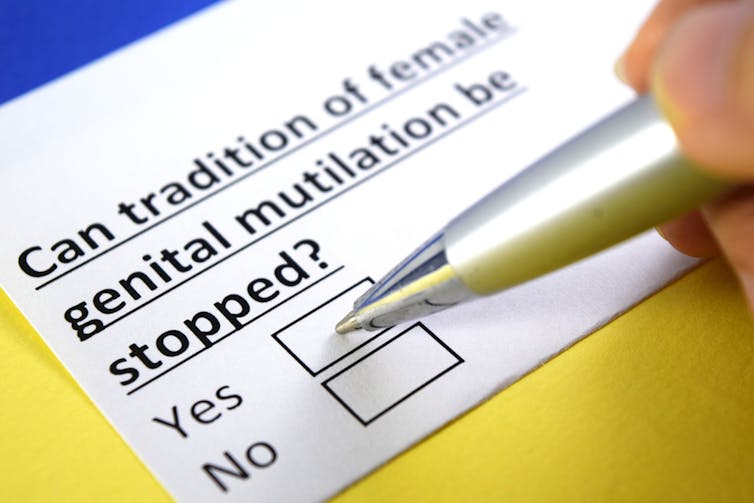
The Australian of the Year Awards includes a category of Local Hero drawn from each state and territory. In 2024, Betul Tuna was Victorian Local Hero for 2024.
![]()

The Australian of the Year Awards includes a category of Local Hero drawn from each state and territory. In 2024, Betul Tuna was Victorian Local Hero for 2024.
![]()
 How do you support women and girls you treat who have experienced female genital mutilation/cutting? The National Education Toolkit for Female Genital Mutilation/Cutting Awareness can provide you with assistance with its postcards.
How do you support women and girls you treat who have experienced female genital mutilation/cutting? The National Education Toolkit for Female Genital Mutilation/Cutting Awareness can provide you with assistance with its postcards.
![]()
 The Shepparton Ethnic Council and other key organisations met on Thursday last week to discuss the next step in protecting girls from female genital mutilation. The morning tea included an invitation to the public to come along and learn more about female genital mutilation and was attended by Victoria police, Goulburn Valley Health, Gateway Health and mental health teams.
The Shepparton Ethnic Council and other key organisations met on Thursday last week to discuss the next step in protecting girls from female genital mutilation. The morning tea included an invitation to the public to come along and learn more about female genital mutilation and was attended by Victoria police, Goulburn Valley Health, Gateway Health and mental health teams.
![]()

Elizabeth Elliott, University of Sydney and Yvonne Zurynski, University of Sydney
Female genital mutilation or cutting is largely hidden in Australia and other high-income countries. Most people don’t consider it a major issue. But our research shows it should be.
Our research found girls are presenting to paediatricians in Australia with female genital mutilation, but misconceptions about the practice are common and doctors want more information on how to manage this illegal practice.
![]()

Female genital mutilation (FGM) comprises all procedures that involve partial or total removal of the external female genitalia, or other injury to the female genital organs for non-medical reasons.
The practice is mostly carried out by traditional circumcisers, who often play other central roles in communities, such as attending childbirths. In many settings, health care providers perform Female genital mutilation due to the erroneous belief that the procedure is safer when medicalized1. WHO strongly urges health professionals not to perform such procedures.
Female genital mutilation is recognised internationally as a violation of the human rights of girls and women. It reflects deep-rooted inequality between the sexes, and constitutes an extreme form of discrimination against women. It is nearly always carried out on minors and is a violation of the rights of children. The practice also violates a person’s rights to health, security and physical integrity, the right to be free from torture and cruel, inhuman or degrading treatment, and the right to life when the procedure results in death.
![]()
 WHAT do you remember from when you were five — your first day at school, playing or having stories read? For Amal Kowhah, memories are stained with pain. It was at the age of five that, like so many other girls raised in cultures where so-called “female circumcision” is practised, her body was scarred by cruel cuts.
WHAT do you remember from when you were five — your first day at school, playing or having stories read? For Amal Kowhah, memories are stained with pain. It was at the age of five that, like so many other girls raised in cultures where so-called “female circumcision” is practised, her body was scarred by cruel cuts.
![]()

Desert Flower: The Extraordinary Journey of a Desert Nomad is an autobiographical book written by Waris Dirie and Cathleen Miller, published in 1998 about the life of Somali model, Waris Dirie. In 2009, a german movie adapation was made. This movie will be screened free during Refugee Week 2016, and is sponsored by the Greater Shepparton Women’s Charter Alliance Advisory Committee.
![]()

Fatu Sillah clearly recalls the day her childhood ended. She was six years old when her mother’s friends invited her to a party with girls from her village near Freetown in Sierra Leone.
“When I got there I saw other girls sitting on the ground crying and I remember the overwhelming smell of a traditional African medicine used to heal wounds. I was taken into the backroom, stripped naked and held down on the ground by six women. I saw the cutter with a small, sharp knife. She said: ‘It will be quick and it won’t hurt that much.’ “
![]()